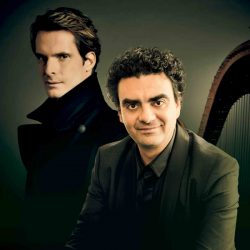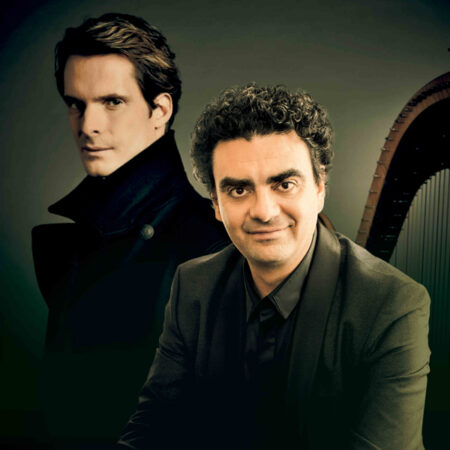 France Serenata Latina: Rolando Villazón (tenor) and Xavier de Maistre (harp). Live stream from Théâtre des Bouffes Parisiens, Paris, and reviewed on 17.7.2020. (JPr)
France Serenata Latina: Rolando Villazón (tenor) and Xavier de Maistre (harp). Live stream from Théâtre des Bouffes Parisiens, Paris, and reviewed on 17.7.2020. (JPr)

Carlos Guastavino – ‘Se equivocó la paloma’; ‘Violetas’; ‘La rosa y el sauce’
Spanish Dance (from Cusco, Peru) – harp solo
Alberto Ginastera – Zamba; Triste; Arrorró; Chacarera (from ‘Cinco canciones populares argentinas’)
Zequinha de Abreu – Tico-Tico no fubá’ – harp solo
Silvio Rodríguez – ‘En estos días’
Yvette Souviron – ‘Al banco solitario’
Ariel Ramírez – ‘Alfonsina y el mar’
Carlos Guastavino – ‘Bailecito’
Rubén Fuentes Gassón – ‘La bikina’
‘La Llorona’ (Mexican folk song)
Alberto Nepomuceno – ‘Coração triste’, Op.18 No.1
Luis Antonio Calvo – ‘Gitana’
On 16 July Rolando Villazón joined renowned French harpist Xavier de Maistre for an exclusive live stream performance from the Théâtre des Bouffes Parisiens of Serenata Latina for Deutsche Grammophon Stage’s The Classical Concert Hall (click here). The short recital featured intimate arrangements for tenor and harp of some Latin American songs. It certainly confirmed the impression – created by Sir Bryn Terfel and his harpist wife Hannah Stone (click here) – that the harp should be strongly considered as an intriguing alternative to the piano; though that seems to be a rather rare at the moment.
Serenata Latina will continue on 2 October with the release of Villazón’s latest album with DG. He has said how ‘This album is a very special serenata, a collection of beautiful traditional folk and art songs from Latin America, a collection of poetry and music of my big homeland.’ The one drawback of this live stream was that there were no subtitles for this selection of songs which will be unfamiliar to many paying a small amount and joining in to listen. It was very pleasant to spend 55 minutes in the company of Villazón and de Maistre, though with only a few fleeting introductions to the music we were hearing, one song seldom seemed very different to any other. I have no doubt that the folk songs and art songs featured the ubiquitous themes of nature, joy, passion, unrequited love, loss, mourning, and more. The composers included Carlos Guastavino, Alberto Ginastera, Silvio Rodríguez, Yvette Souviron, Ariel Ramírez, Rubén Fuentes Gassón, Alberto Nepomuceno, and Luis Antonio Calvo. For Villazón they all ‘drank from the European tradition … but remain rooted in the soil of [the Latin American] rich, colourful, sometimes melancholic yet always resilient culture.’
De Maistre also had three solo chances to demonstrates his own virtuosic gifts, even if that wasn’t evident from his near-perfect accompaniment to all Villazón sang. Zequinha de Abreu’s upbeat ‘Tico-Tico no fubá’ gave us the chance to see de Maistre’s fingers flying across the strings and Guastavino’s ‘Bailecito’ was, by contrast, rather soulful and dreamier.
Given the restricted circumstances it was all elegantly filmed by director Jean-Pierre Loisil with Villazón and de Maistre alone onstage in the darkened theatre. The decoration on the sides of the stage had a rather distressed look and overall, it was as if they were playing inside an Egyptian temple rather that the theatre founded in 1855 by Jacques Offenbach for the performance of opéra bouffe and operetta.
Villazón’s recent singing career has been blighted by vocal crises but it good to hear that this sounds as if it might be a thing of the past as this programme was sufficiently challenging to have shown up any deficits. His highest notes were not tested so what opera’s post-Covid-19 future will find Villazón doing is unclear at present and, anyway, since his directing debut in 2010 in Lyon there have been several other subsequent new productions. He has also had novels published, been appointed ambassador of the Salzburg Mozarteum Foundation, and is currently artistic director of the Salzburg Mozart Week.
I can only mention a few highlights beginning with Guastavino’s ‘La rosa y el sauce’ (‘The rose and the willow’) about a girl who steals a rose from a willow tree only to leave it in despair. After de Maistre’s beautiful introduction Villazón’s expressive voice was heard at its best and there were some eloquently shaped long lines. Villazón has always had a very engaging personality and you can rarely fail to warm to him. Never in doubt is his great ability to communicate the meaning of any song and Ginastera’s two dances, a lullaby, and a lament, were perfectly characterised. Ramírez’s ‘Alfonsina y el mar’ is an anguished zamba (a slow Argentinian dance) about someone’s suicide in the sea and found Villazón at his most impassioned. Thankfully, Gassón’s ‘La bikina’ was a cheerier affair than some of the other songs we heard, whilst the famous Mexican folk song ‘La Llorona’ (‘The Weeping Woman’) about a legendary figure – just as ‘La bikina’ – was plaintive and sung with deep emotion. Nepomuceno’s ‘Coração triste’ was another sad song about how painful it is to live in solitude, before Calvo’s ‘Gitana’ brought Villazón and de Maistre’s special event to a lilting conclusion.
Rolando Villazón seemed to suggest he is close to his best again. A truly memorable occasion in this ‘new normal’ for live performance.
Jim Pritchard

Thanks for this Jim. I continue to follow Rolando Villazón with some interest. His lower notes were always his biggest problem and here as previously he is reduced to half speaking them. But in this repertory his ‘biggest problem’ doesn’t really matter, not least because he is always an actor with every note. You could say that it is almost his defining quality. And he remains as handsome as ever. With volcanic passion. The harpist is terrific too.
If anyone develops an appetite for voices with harp and is near St Paul’s Cathedral, toward Christmas, they should make their way there to hear the boys of the School perform Britten’s ‘A Ceremony of Carols’. I once took a Syrian young friend to see the Cathedral and the boys came in for their dress rehearsal of the Britten. He was moved to tears. Forgot all about the Cathedral. But not the Britten. He says he plays the recording with the harpist Osian Ellis (for whom Britten wrote the piece) all the time.
Thanks Jack. His Hoffmann for his Covent Garden debut in 2004 is something that I doubt I will ever hear bettered. Considering all the ups and downs of his relatively short career it was good to hear him sing so well in repertoire that undoubtedly suited him perfectly. Jim